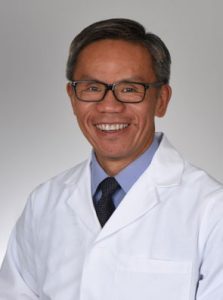Dr. Angello Lin, the new transplant surgery section chief at Wellstar MCG Health, had a light bulb moment when he took three years off during his 23-year tenure as a surgeon at the Medical University of South Carolina.
He took a break to spend time in Savannah, Ga. with his father, who had turned 90 and was having health issues. During that time, he had time to think and realized that although he had become a transplant surgeon because the work seemed dynamic, his work had not been very dynamic lately. He had been solely focused on performing the transplantations and taking care of patients for 14 years.
“I started to wonder if I could add some dynamism back by finding different and better ways to do a transplant,” he said.
The break served him well as Dr. Lin went on to become the first surgeon to successfully connect a pancreas and kidney before putting it into the patient’s body, rather than putting them in separately. Implanting them as one organ with one arterial inflow and one venous outflow reduced the patient’s time in the operating room from 4-6 hours to 2-3 hours, making it safer and giving patients the potential for a quicker recovery.
Dr. Lin, who graduated from Emory School of Medicine, found a renewed sense of purpose in innovation in surgery and decided he wanted to work at a hospital that would encourage his innovation. That led him to Wellstar MCG Health’s transplant center, which has received grants from the Mason Trust Foundation to enhance transplant research, education and patient care. The transplant center also performed a record 105 kidney transplants last year.
“The Surgery department here is very supportive of me trying new ways of doing things, and I was drawn to that,” Dr. Lin said.
He joined the hospital on Feb. 5 and is already working on a pilot project that infuses therapeutics which hopefully will reduce injuries to kidneys after transplantation from ischemia repercussion. He will also help the transplant center restart its pancreas transplant program.
Dr. Lin spends his time out of the hospital with his wife and three daughters: Jasmine, 24, who plans to go to medical school, Camille, 21, who is studying to become a pilot and Abigail, 13, who is in eighth grade.
While born in Taiwan, Dr. Lin moved to Tybee Island as a teen and later graduated from Emory with a bachelor’s in chemistry. He first became interested in transplant surgery during his general surgery rotations as a fourth-year resident when he saw the difference transplantation made in patients’ lives.
One story that stands out to him was when he was taking care of a retired chemistry professor, a liver transplant recipient who was near death. Although the patient was depressed, he told Dr. Lin about himself, including his favorite movie – “Dead Poets Society” – and about his dream to travel the world. The next day, Dr. Lin came into the patient’s room, stood on a chair, and recited the famous poem from “Dead Poet Society” to encourage the patient.
“O Captain! my Captain! rise up and hear the bells,” he said. “Rise up—for you the flag is flung—for you the bugle trills.”
The patient went on to recover and sent Dr. Angello postcards from his travels around the world.
“After a successful kidney transplant, patients are so grateful and will say, ‘I can go to the bathroom again!’” he said. “They are so excited to be able to do the everyday things our bodies do that we take for granted. It’s very touching.”
Following residency, Dr. Lin became the first trainee to complete Emory’s transplant fellowship in 2000.
Now Dr. Lin estimates he’s performed over 1,500 transplant surgeries. The most difficult part of the job remains working around the nationwide organ shortage. He has to be ready to drop everything when an organ is ready to be donated and, sadly, he also has to tell patients that they are at the mercy of the waitlist.
In one instance, a patient with acute liver failure was given 24 hours to live if she didn’t get a liver transplant. By chance, Dr. Lin mentioned the patient to a coworker in the operating room, who happened to know a friend whose son had just been shot and wasn’t going to survive. His family may be willing to donate his liver, he said. The coworker contacted his friend, and within 24 hours, the woman had a new liver and survived. Her life had been saved due to a passing conversation in the hospital operating room!
“They look to us to be the miracle workers, and some days we come close,” he said. “But other days, we’re just human.”


